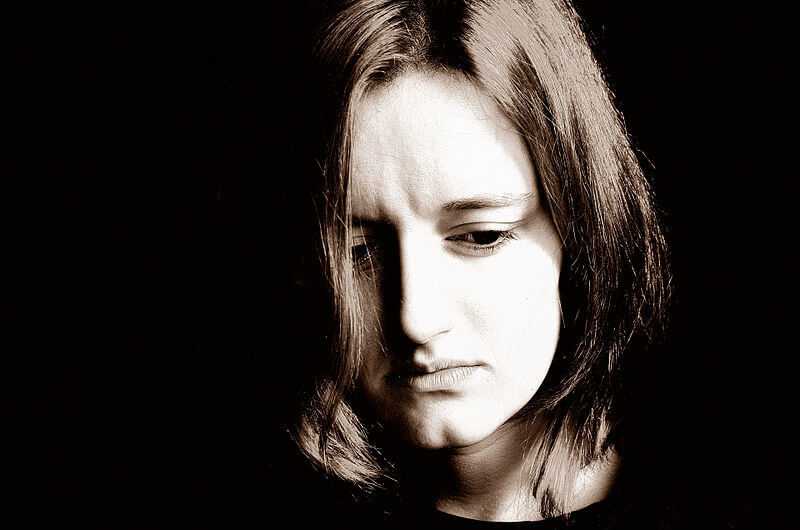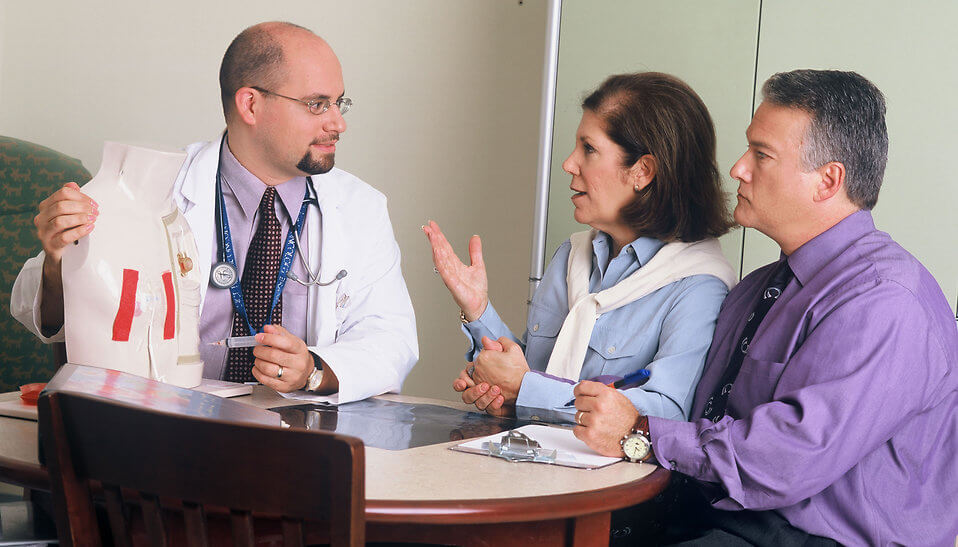n this article, we will cover common signs and symptoms that can help you figure out if you have depression, how to deal with depression in your everyday life and how to find professional treatment for depression so that you can begin to return to a happier, more normal life.
According to the Anxiety and Depression Association of America (ADAA) today in the U.S. nearly 15 million people suffer from depression-and for 22% of these people it is persistent depression, meaning it's a depressive episode that lasts for longer than two years and doesn't go away on its own or the sufferer has frequent depressive episodes that continue to reoccur. This is a staggering statistic that demonstrates you are not alone if you've ever felt you may suffer from depression or have depressive tendencies.

Source: schriever.af.mil
How to know if you have depression - signs and symptoms
Unlike other mental health disorders than can be easier to detect, people with depression may find they-at least initially-have a tendency to "shrug off" their depressive feelings, trying to convince themselves it's just a few off days or that feeling down or sad is just a normal part of life. And it is, but for how long? How do you tell the difference between sadness and depression?

Source: commons.wikimedia.org
If you've wondered if you could have depression or if the feelings you've been experiencing are normal there are some common signs and symptoms to be aware of that can help you decide if you should seek professional treatment. These symptoms generally occur for most of your day without letting up and can continue on for days or even weeks and months at a time (Mayo Clinic Staff, n.d.).
- Feeling sad, lost, empty, hopeless, or just generally unhappy
- Losing interest in or enjoyment from activities you previously enjoyed (socializing, sex, hobbies, etc.)
- Changes in sleeping habits ranging from insomnia to spending most of your time sleeping or in bed
- Exhaustion and a lack of energy that makes even simple everyday tasks seem difficult
- Appetite changes (commonly lack of appetite and weight loss but occasionally increased to desire to eat and weight gain)
- Anxiety, agitation, and restlessness
- Slowed thinking or difficulty paying attention
- Feeling worthless or not good enough (often in conjunction with overthinking past mistakes or failures)
- Feeling guilty about things that aren't your fault or are out of your control
- Difficulty making decisions or remembering things
- Frequent or recurrent thoughts of death or suicide
- Physical issues, such as headaches or muscle pain
It's important to remember that not everyone with depression will have all these symptoms and that there may be other signs of depression that you've experienced not on this list. However, it is important to understand that if you're wondering how to cope with depression or if you have depression that there are resources available to you to help you begin to learn how to deal with it.
How to diagnose depression
While reading over the symptoms of depression may help you better understand the disorder and give you some sense of the way you're feeling, a professional diagnosis is typically necessary for successfully overcoming depression.
However, if you're still unsure of how severe your symptoms are or want other resources to help you know if you're depressed there are online depression assessments available. These assessments will ask questions to gauge your current emotional state and give you an idea how it compares to current symptoms of depression. A simple online search can help you find a few idea to take to have a better understanding of what symptoms you may have and give you some specific talking points to bring to a professional in order to get a diagnosis and begin talks of treatment.
A formal diagnosis must come from a professional-typically your doctor or a mental health provider-and will generally consist of the following diagnostic steps:
- Physical exam: this is helpful in ruling out depression like symptoms as a result of a separate health problem-this often includes lab tests that can further rule out depression symptoms from issues with hormones, your thyroid, etc.
- Psychological evaluation: a discussion of your symptoms, thoughts, feelings and behavior patterns (including when they started and any notable events that may have happened to you during that time)
- DSM-5: Criteria for depression listed in the Diagnostic and Statistical Manual of Mental Disorders (DSM-5) that your mental health counselor can use to compare your symptoms to and make a final diagnosis

Source: freestockphotos.biz
While it can be difficult to admit to yourself or others that you have depression, understanding the symptoms and finding a professional to talk to will go a long way in helping you learn how to overcome depression.
How to deal with depression alone - self-help tips when you're waiting to get treatment
Seeking professional treatment for depression-while your best bet for a full recovery-isn't an easy task. It can be difficult to open up about your symptoms or you simply might not have ready access to professional treatment. However, that doesn't mean you need to continue living with your depression as you are now. There are things you can do to help yourself cope with your depression until you are ready and able to get professional help.
Stay connected: typically having depression causes you to want to withdraw from the people around you. However, isolating yourself can actually worsen your symptoms. Making an effort to stay connected-even just to a few people-can give you the support you need to feel some temporary relief from your symptoms.Not to mention talking to people can help you focus less on your own feelings and more on what's going on outside of your depression.
Do things for yourself: you won't be able to force yourself to feel happy; however, you can at least make attempts at keeping up with things you previously found enjoyable or found relaxing. Get out and exercise, sit down with a book and a cup of tea, or try out some meditation-you may not enjoy everything that you once did but taking the time to focus on something just for yourself can help you find one or two activities that can help you handle depression.
Remember your physical health: while matters of physical health may not feel important, keeping up with things like a nutritious diet or getting enough sleep at night can help you on your journey to figure out how to beat depression. Issues with physical health can add further stress and anxiety that worsens depression. So take the time to make sure you incorporate some form of exercise into your day (whether it is something as simple as a few yoga poses or more physical like a run) and focusing on foods low in sugar and refined carbs and high in nutrients (particularly B vitamins, which have shown in studies to trigger depression when you don't have enough of them).

Source: pxhere.com
Get some sun: studies have shown that sunlight can improve overall mood, so making sure to get outside for a few minutes every day can reduce feelings of depression.
Challenge negative emotions: it's important to actively think of your depression and depressive thoughts (e.g. you're not good enough, nothing good is happening in your life, etc.) are separate from you. These thoughts and symptoms are not an accurate view of who you are and how your life is going. So, while difficult, it's important to try to challenge negative thoughts stemming from your depression and find positive thoughts to focus on instead.
Expose yourself to funny and lighthearted entertainment: it may seem too simple but even watching a funny movie or reading a book more suited to a lazy Sunday than a classroom discussion can help you combat depression by making you smile and laugh, pulling you out of depression for a short while.
If you're suffering from depression and are still in the process of getting professional help, trying these different self-help techniques can lessen your symptoms and help you recover a sense of normalcy in your life. However, it is best to note that these are meant to be temporary and supplementary tips for a professional treatment plan.
How to get help for depression - seeking professional treatment
When it comes to seeking treatment for depression you've got a few different options. If you've never worked with a therapist or other mental help professional you can find one that's right for you and your symptoms through a few avenues.
First, you can generally look through a directory of mental healthcare providers that are part of your health insurance network on the company's website. This can ensure that you're going to get treatment from someone who is covered by your insurance. Second, you can do an online search through a directory listing all mental health professionals in your area. Typically, these will list more detailed information on each professional than your insurance company and allow you to select a therapist or counselor who is best for you situation. And, finally, you can talk to your doctor to see if there is anyone they can recommend to you. This way you'll have a firm referral from another medical professional you trust.
Once you've got a list of potential treatment providers, if you feel up to it, give them a call to see if they'll be a good match for you. And if not try asking someone you trust and who knows you well to make the calls for you. This way you can be fairly sure that you've found someone you'll be comfortable receiving help from.
Professional depression treatment techniques - how to get rid of depression
After deciding to receive professional treatment for depression, you'll see that there are two general types of depression treatment-talk therapy or medication-both of which have multiple different types that are used based on what your treatment provider believes will work best for you.
Antidepressant Medications: prescription drugs that improve the way the brain uses certain chemicals that control your mood and making sure they're properly balanced. They come in a few common types (but there are some anti-depressants that exist outside these types-your healthcare provider can give you a full list of options).
- Selective serotonin reuptake inhibitors (SSRI) - the most commonly prescribed antidepressants that increase the level of serotonin (a chemical messenger in the brain) and block its resorption or reuptake, ensuring enough is available. They are ideal for moderate to severe depression and typically have few side effects.
- Serotonin and norepinephrine reuptake inhibitors (SNRI) - a newer antidepressant, SNRIs affect both serotonin and norepinephrine uptake, which together help regulate mood and transmit information through the brain. These have fewer side effects than SNRIs.
- Tricyclic antidepressants (TCA) - some of the earliest antidepressants used for treatment but have mostly been replaced due to their high number of side effects. They work similarly to SSRIs and SNRIs by helping regulate brain chemistry.
- Monoamine oxidase inhibitors (MAOI) - these are typically antidepressants that are recommended when others have had provided little improvement in mood or symptoms or caused issues from too many side effects. They work to rebalance brain chemical thought that causes depression.
Talk therapy: the act of discussing symptoms, feelings and related experiences with a mental health professional to treat depression or other mental health issues. Talk therapy covers many different therapy techniques.
- Cognitive-Behavioral Therapy -this type of therapy is designed to help you learn how to alter negative thinking and to begin viewing your life and environment in a more positive light. It can help you identify what's contributing to your depression and what triggers make it worse.
- Interpersonal therapy - therapy designed to help you work through relationships or events that altered a relationship that may contribute to depression, including loss of a loved one, the end of a romantic relationship, or problems with your parental relationships.
- Problem-Solving Therapy - this type of depression treatment can help you become better able to cope with difficult, stressful or tragic life events. This technique typically involves creating a step-by-step process for realistically coping with a given situation. This is especially useful for older adults with depression.
Depression isn't something anyone should have to struggle with on their own. If you think you have this disorder and want to know how to treat depression, connecting with a mental healthcare provider gives you the best chance for successfully overcoming it and returning to a more normal and balanced life. Don't wait-talk to someone today about how you can get rid of depression.
Source: betterhelp


To deal with depression these are good techniques. But taking Antidepressant or herbal supplements for depression is the most easy way to get rid from depression
ReplyDeleteI think this is a really good article. You make this information interesting and engaging. You give readers a lot to think about and I appreciate that kind of writing.
ReplyDeleteMental Health Depression Treatment
Your tips to deal with depression are really useful. But to overcome from depression the supplements for depression is more effective way.
ReplyDeleteThank you for sharing so much information about depression. In this article, you mentioned some amazing tips to prevent depression. There are the best Psychiatrists in Ludhiana for treating depression diseases.
ReplyDeleteIt is a very informative and useful post thanks it is good material to read this post increases my knowledge. Depression Symptoms in Women
ReplyDeleteKeep sharing such posts. The most famous stress reduction therapy center in San Digeo offers holistic psychotherapy services, anxiety treatment and trauma therapy to adults, teens, individuals, couples, and families. Call Today!
ReplyDeletepsychologist San Diego
Hi Very Nice Blog I Have Read Your Post It Is Very Informative And Useful Thanks For Posting And Sharing With Us. Latest Treatment for Mental Health-Depression & Anxiety- Non Medication Treatment
ReplyDeleteThis comment has been removed by the author.
ReplyDeleteExcellent post.Never knew this, regards for letting me know.
ReplyDeletedepression counseling long beach
This is one of the best blog I have came through, Professional talk therapy center offers Somatic Experiencing therapy in San Diego, a body based trauma resolution therapy which helps in recovering from traumatic events and symptoms.
ReplyDeleteSan Diego therapist
I am so glad after reading your blog. It is worth reading, as it contains very useful information on depression.
ReplyDeleteSexologist in Bhopal
OCD treatment in Bhopal
De addiction clinic in Bhopal
Psychiatrist in Bhopal
This blog is really helpful for me as I was looking for Georgetown's professional adolescent counseling services. Thanks for sharing it.
ReplyDeleteTherapy Cedar Park
Such a nice post. Thanks for sharing this informative blog with us, you can read more detail about stress and depression treatment by visiting by page ADHD Treatment in Punjab.
ReplyDeleteThis is the kind of blog i was looking for. The best anxiety treatment and trauma therapy center based in San Diego offers Somatic Experiencing therapy in San Diego, a body based trauma resolution therapy which helps in recovering from traumatic events and symptoms.
ReplyDeleteaffordable marriage counseling San Diego
This comment has been removed by the author.
ReplyDeleteHello, I find this post nice... I'm so glad I came to your blog; I'm here right now to say thank you for a fantastic piece and an all-around engaging website. Please continue to perform a fantastic job. Keep up the good work. depression treatment
ReplyDeleteThanks for sharing the information. I like your content very much. If you are looking the best psychiatrist in Jaipur then contact to Dr. Kapil Sharma. He is the best psychologist in Jaipur.
ReplyDeleteRecovery is very much important and you need someone who understand you.. and thanks for sharing this amazing post. I really like it. To get out of depression start taking organic supplements for depression
ReplyDeleteIf you need online counseling for Depression, you've come to the right place. Depression counseling like Kentucky Counseling Center is a great way to treat your condition from the comfort of your own home. There are many benefits to this type of treatment, including its availability and cost.
ReplyDeleteKeep sharing such posts. Trauma resolution therapy center in San Digeo offers premarital therapy and marriage counseling in San Diego for couples to better understand the dynamics of a relationship and support healing and growth.
ReplyDeleteSomatic therapy San Diego
If you are struggling with depression or anxiety, you are not alone. Millions of Americans suffer from these mental health conditions, and many don't know where to turn for help. If you are not sure what kind of treatment is right for you, talk to your doctor or a mental health professional. They can help you find the right resources and support to get on the road to recovery. Consult with the best anxiety doctor in Jaipur or best anxiety doctor in Jaipurbest psychiatrist in Jaipur and get the best counselling.
ReplyDeleteNice article .thanks for sharing
ReplyDeleteOnline Counseling
Keep sharing such posts. Trauma resolution therapy center in San Digeo offers premarital therapy and marriage counseling in San Diego for couples to better understand the dynamics of a relationship and support healing and growth.
ReplyDeletesomatic trauma therapy San Diego
Thanks for sharing this informative blog with us. If you are suffering from a depression and looking for the managing depression and anxiety therapy or treatment, so you are at the perfect place. Dr. Nazempoor is available here to provide the best service, which will helpful to recover from depression and anxiety.
ReplyDeleteThe comprehensive guide on how to deal with depression provides invaluable insights into understanding, managing, and seeking appropriate treatment for this challenging condition. How Chatgpt Is Transforming Health Industry
ReplyDeleteThe comprehensive guide on dealing with depression provides a wealth of valuable information, practical strategies, and compassionate support. 8194 The Importance Of Two Factor Authentication 2Fa For Online Accounts.Html
ReplyDelete